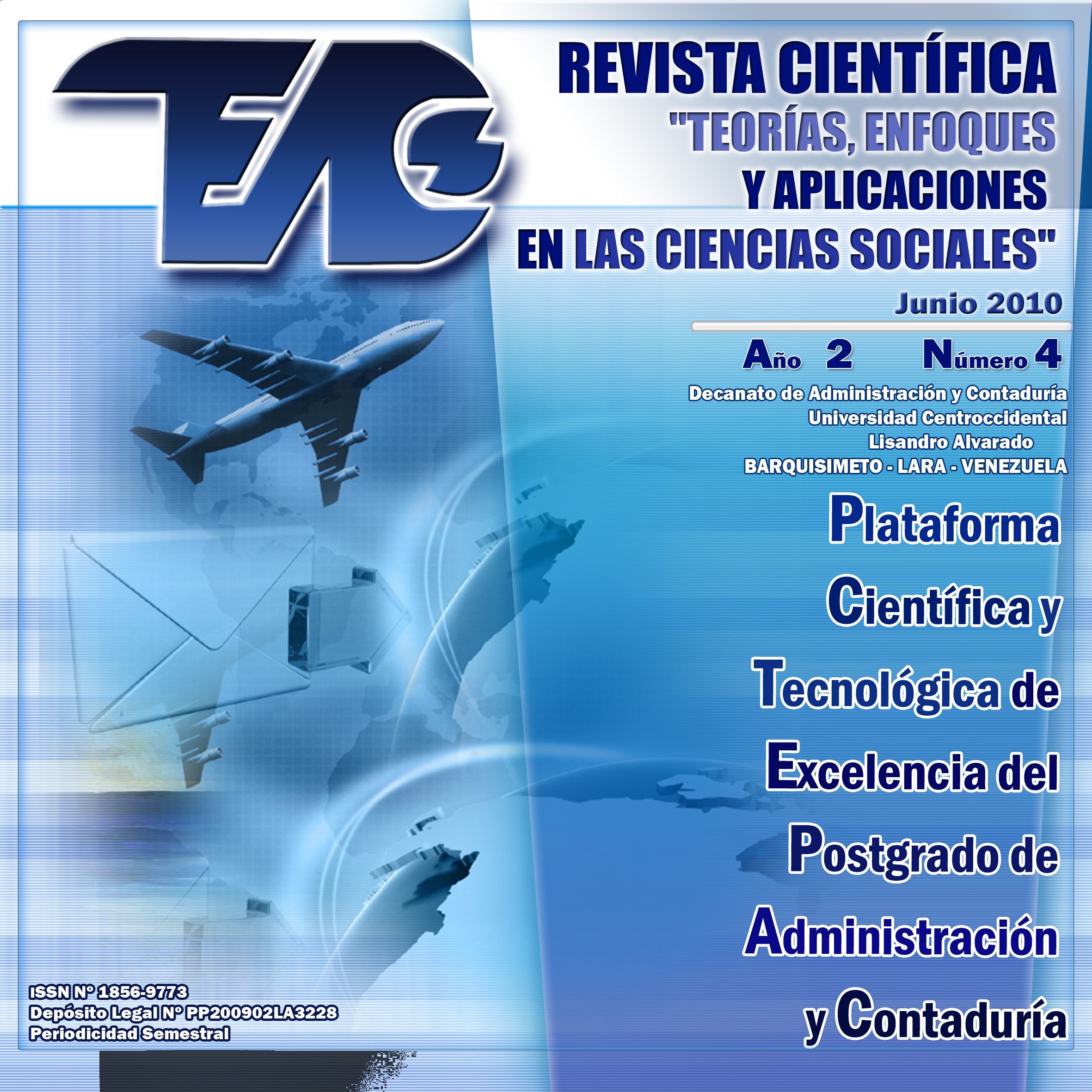Labour skills and culture university researchers. Coopetition networks
Keywords:
university research culture, job skills, networks coopetitionAbstract
This dissertation is a reflection, supported by two previous investigations by the writer, the aim is to relate the work skills required by the working environment in Latin America and the responses from the Venezuelan higher education can lead to a changing environment, to articulate these results Approximate diagnosed with university research culture. Then we present a proposal to provide college and environment linkages, and favors a relationship of cooperation and competition between the requirements of the workplace, the skills of university graduates and university research praxis. The method applied to investigations that give rise to this article are focused on: a) review of documents concerning the study (job skills and environment) and b) the hermeneutic interpretation of the data collected through interviews with key informants and the review and analysis literature. In conclusion arises: a) the need to prevail in the Venezuelan university proactive in its relationship with the environment, b) to replace a research culture focused Orthodox culture of obedience, order and pre-established paths, the other marked by the diversity and complexity of social facts, and in keeping with the paradigm shift in the concept of science knowledge and c) promoting innovation in the public university in Venezuela, through its collective mobilization is that habituation to the dialogue, shared knowledge, teamwork and co-opetition networks.
Downloads
References
Capra, Fritjof (1996), El punto crucial. Ciencia, sociedad y cultura naciente. Editorial Estaciones. Argentina.
Carvajal Beatriz Y Carvajal, Moraima (2010) “Universidad y Entorno laboral: Visión Prospectiva de la Educación Superior desde la Perspectiva de las Competencias Laborales”. Revista Informe de Investigaciones Educativas. Volumen XXIV. En imprenta.
Carvajal, Beatriz (2009) “Inter y transdisciplinariedad en el discurso investigativo universitario. Cómo favorecer su práctica en la universidad venezolana desde la heterodoxia”. En: Discurso y Comunicación. Investigación interdisciplinaria en Ciencias Sociales. Comp., Alicia Inciarte. Maracaibo: La Universidad del Zulia. En imprenta.
Davenport, John, C. Beck Y Thomas H. (2002). La Economía de la Atención. Editorial Paidós. Barcelona: España.
Maturana, Humberto Y Nisis, Susana (2001). Formación Humana y Capacitación. UNICET. Editorial Dolmen. Chile.
Maturana, Humberto. & Varela, Francisco. (1999) El árbol del conocimiento. Las bases biológicas del entendimiento humano. Editorial Universitarias, Chile.
Martínez, Miguel (2008), “Investigación Cualitativa y el paradigma de la Complejidad.” Conferencia dictada en el Instituto Tecnológico Barquisimeto, Estado Lara. 18 de Julio.
Ohmae, Kenichi (2005). El Próximo Escenario Global. Editorial Norma, Bogotá.
Organización Internacional del Trabajo (2009). Tendencias Mundiales del Empleo. Ginebra: Organización Internacional del Trabajo
Pinchot, Gifford y Pinchot. Elizabeth (1996). The Intelligent Organization. Editorial Berrett -Koehler Pub. San Francisco, United States.
Spencer, Jr. McClelland D. and Spencer S. M (1994). Competency Assessment Methods. History and State of the Art. Editorial Hay/Mc. Research Press. United States.
Stewart, Thomas (1998). La nueva riqueza de las organizaciones: El capital intelectual. Editorial Granica, Buenos Aires, Argentina.
Teece, David (2001). Managing Intellectual Capital. Oxford University Press. Reino Unido
Vargas, Fernando (2004). “Competencias clave y aprendizaje permanente”. Recuperado el 27 de Julio de 2009, de Centro Interamericano de Investigación y Documentación sobre Formación Profesional (CINTERFOR): http://www.cinterfor.org.uy/public/spanish/region/ampro/cinterfor/publ/vargas/index.htm
Published
How to Cite
Issue
Section
Derechos del/de autor/es a partir del año de publicación
Esta obra está bajo la licencia:
Creative Commons Reconocimiento-NoComercial-CompartirIgual 4.0 Internacional (CC BY-NC-SA 4.0)
Las opiniones expresadas por los autores no necesariamente reflejan la postura del editor de la publicación ni de la UCLA. Se autoriza la reproducción total o parcial de los textos aquí publicados, siempre y cuando se cite la fuente completa y la dirección electrónica de esta revista. Los autores(as) tienen el derecho de utilizar sus artículos para cualquier propósito siempre y cuando se realice sin fines de lucro. Los autores(as) pueden publicar en internet o cualquier otro medio la versión final aprobada de su trabajo, luego que esta ha sido publicada en esta revista.



